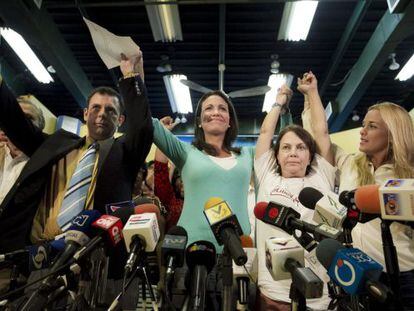Tensions rise in Venezuela after 14-year-old is shot dead at protest
Police ransack opposition party's HQ after officials sign national transition manifesto

A 14-year-old boy was shot dead on Tuesday during an anti-government protest in the western Venezuelan state of Táchira, fueling the already volatile political situation in the country triggered by last week’s arrest of Caracas Mayor Antonio Ledezma.
Authorities said they had arrested a 23-year-old national policeman for allegedly shooting Kluiver Roa, a student attending a demonstration in San Cristóbal, the Andean city at the epicenter of last year’s violent protests that left 43 dead.
There are contradictory versions of what occurred during the protests in San Cristóbal
The incident occurred after the government authorized the use of lethal force to control public demonstrations and other events.
“I want to publicly condemn the vile murder of Kluiver Roa, who was despicably murdered by alleged members of the PNB [Bolivarian National Police], who are now in custody,” said public defender Tarek William Saab.
The arrested officer, who allegedly pulled the trigger, has been named as Javier Mora Ortiz.
Hours later, President Nicolás Maduro also condemned the murder. “It is such a pity that we have lost this boy during an unbelievable incident of confusion,” he said, adding that the victim was influenced by “far-right groups who are poisoning the minds of some young people.”
There are contradictory versions of what occurred in San Cristóbal’s Barrio Obrero on Tuesday.
One witness said the boy approached a group of demonstrators after he left school but didn’t participate in the protests. When the police closed in, the majority of the protestors scattered but Roa tried to hide under a vehicle and was shot dead by an officer at close range.
According to a statement released by Táchira state security chief Col. Ramón Cabezas, a group of hooded youths attacked the police with rocks and Molotov cocktails. They knocked down one officer and began kicking him.
Another officer began firing into the ground to disperse the demonstrators but Cabezas said he was not sure if it was Mora Ortiz. The security chief said Roa fell under a car and police tried to help him but the angry protestors prevented them from rescuing the 14-year-old, who later died on the way to the hospital.
The student’s death has become another volatile factor in the political and social crisis in Venezuela
“We regret these types of incidents because these are situations that can be avoided. We are not fomenting the violence that is being generated by a group of people whose identities are unknown,” said Cabezas, who added that several people have been detained.
San Cristóbal was last year racked by violent protests that later spread across the country. Anti-government demonstrators, Maduro supporters and soldiers were among the 43 people who were killed.
Roa’s death has become another explosive factor in the political and social crisis that has put Venezuela on edge.
Scattered protests have been held to demand the release of Caracas Mayor Ledezma, a major opposition figure, who was arrested on Thursday on charges of plotting a coup.
Bickering opposition parties decided to put aside their differences and ask Maduro to step down
On Tuesday, bickering opposition parties decided to put aside their differences and join a public call for Maduro to step down and call early elections. Ledezma and two other opposition leaders, Leopoldo López and María Corina Machado, were the first to sign a public manifesto calling for a national pact for a transition government.
The document, which was published in El Nacional newspaper on February 11, infuriated Maduro, who had Ledezma arrested on conspiracy charges.
López is already in jail facing sedition and other charges related to last year’s protests. The public prosecutor has also filed charges against Machado for allegedly plotting to assassinate Maduro, but so far she has not been arrested.
On Monday, the Social Christian Copei party, a major opposition group, signed the national transition petition along with other minor parties.
Afterwards, Copei officials reported that police had ransacked the party’s headquarters in Caracas and threats were received at their offices in other parts of the country.
Rights group demands release
The Inter-American Commission on Human Rights (IACHR) in Washington issued a statement on Tuesday calling for the release of Venezuelan opposition leaders Antonio Ledezma, Leopoldo López and Daniel Ceballos, the former mayor of San Cristóbal who was also jailed last year following the disturbances in his city.
“The IACHR stresses that holding civilians in custody in a military prison is incompatible with international standards,” the statement said. The three are being held at the Ramo Verde military prison outside Caracas.
“The commission urges the state not to criminalize opposition political leaders and to guarantee the participation of all sectors of Venezuela’s political life and the human rights of those who identify themselves with the opposition to the government,” the IACHR said
Last year, a UN working group on arbitrary detention concluded that the arrests of López and Ceballos were arbitrarily carried out and urged the Venezuelan government to release them.
The IACHR also recounted the incident that took place on February 12, when a group of more than 30 heavily armed officers, dressed in black and wearing ski masks, burst into the cells where Leopoldo López and Daniel Ceballos were being held at Ramo Verde.
According to the information received by the commission, the agents were dressed in uniforms that bore the initials of Venezuela’s General Directorate of Military Intelligence. López’s wife and his lawyer said the agents destroyed and confiscated personal belongings and transferred the men to punishment cells.
“The commission reminds the State of Venezuela of its obligation to guarantee the life, humane treatment, and safety of all persons deprived of liberty, as well as to guarantee conditions of detention that are in line with applicable international standards," the IACHR said.











































